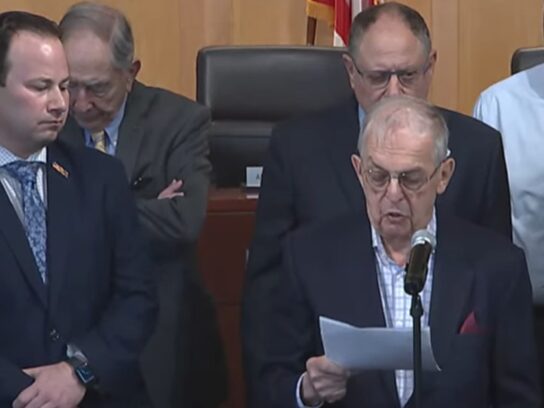
Holocaust survivor Lou Pohoryles recalled his early life of hunger, surgery without anesthesia, lice and the death of his parents and most of his relatives during the Montgomery County council meeting Tuesday.
During that meeting, councilmembers declared April 18 as Holocaust Remembrance Day in Montgomery County.
The worldwide remembrance day is “a time to mourn and remember the six million Jewish men, women and children who were murdered in the Holocaust,” U.S. Rep. Jamie Raskin tweeted.
In a proclamation, councilmembers urged residents “to recommit themselves to not bear silent witness to injustice and to always remain vigilant to the principles of a just society.”
Council Vice President Andrew Friedson called on county residents to stand together as a community against antisemitism. He noted that the death of six million people “is roughly equivalent” to the entire population of Maryland.
According to Councilmember Sidney Katz, antisemitic incidents in the county spiked 261% this year, with many of the acts taking place in schools. During February, there were nine incidents in one week at Montgomery County Public Schools, he said.
Council President Evan Glass stressed the importance of not only remembering the Jews who were slaughtered, but also “the five million also killed for being different, for being political dissidents, for being LGBTQ, for being ethnic minorities.”
“We have to remember that the pluralistic society, the open society that we all cherish here in Montgomery County, that we all cherish in the United States, is at risk and so this gathering, this day, is as much a remembrance of the six million who died, but a fight and a struggle for the community we want and the community we need.”
Pohoryles was born in Poland in 1937 in what is now the Ukraine. He was a young boy when his father sent him to live with a Polish devout Catholic woman, where he spent much time hiding in an attic and cellar and listening to the sounds of war outside.
He was transferred by cattle car to a labor camp in Germany with his sister and ended up on a farm.
Following the war, he lived for a few years in a displacement camp before coming to New York in 1947 as “an undocumented, illiterate 10-year-old poor speaking orphan who did not know the alphabet or simple numbers.”
He went on to become a lawyer, marry and raise three children. But to this day, he said, he often remembers his hunger and the sight of dead bodies brought to a nearby churchyard for burial.
Councilmembers @Andrew_Friedson, @MC_Council_Katz and @CMEvanGlass present a joint proclamation commemorating Holocaust Remembrance Day (Yom Ha’Shoah). They were joined by survivors and family members of survivors. pic.twitter.com/wHYddAgzes
— Montgomery Council (@MoCoCouncilMD) April 18, 2023
I’m thankful to have heard the stories of Lou Pohoryles and Manny Mandel, two Holocaust survivors, during the Council’s Holocaust Remembrance Day breakfast. Let’s take a moment to honor the millions of lives lost and impacted by the atrocities of the Holocaust. pic.twitter.com/cZ5rG20yd9
— Councilmember Will Jawando (@CMJawando) April 18, 2023
Thank you @GovWesMoore #YomHaShoah #NeverForget #NeverAgain https://t.co/g7rpTKpWsh
— JCRC of Greater DC (@JCRCgw) April 18, 2023

Comments are closed.